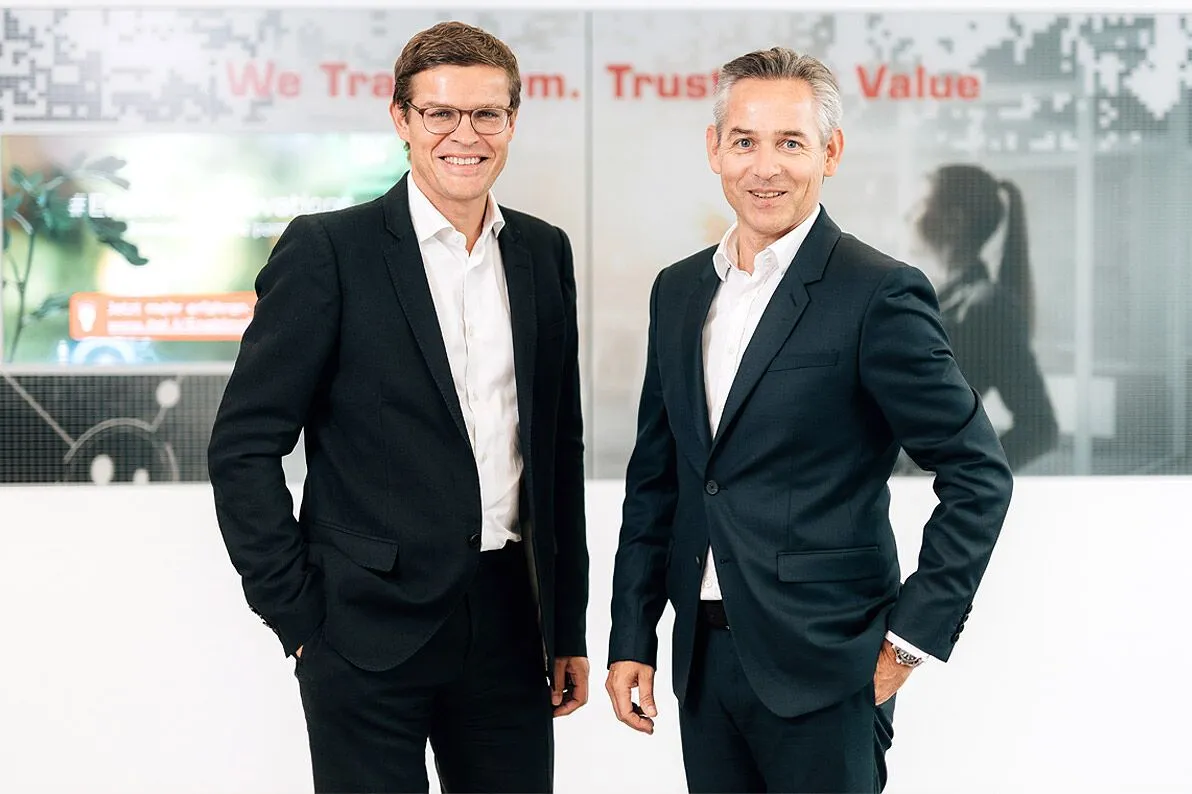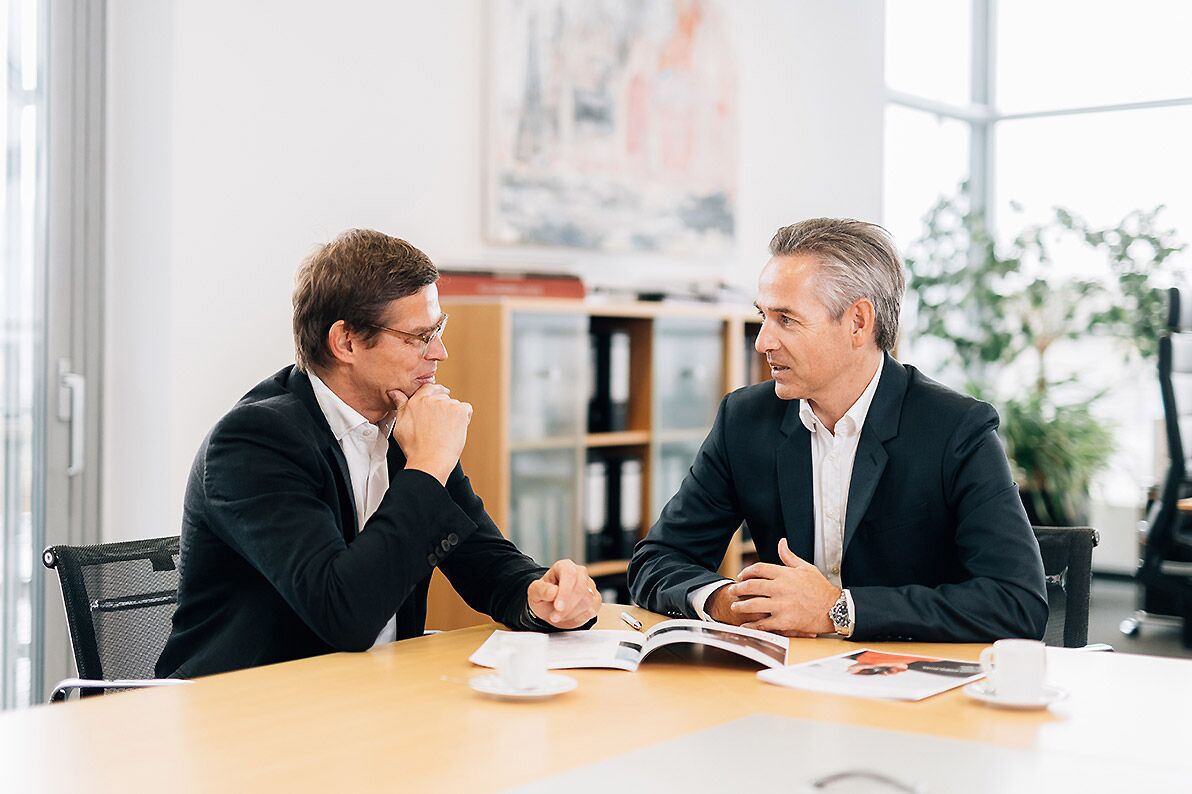
New mission statement for itelligence
Last year, itelligence - one of the leading IT consultancies focussing on SAP and the midmarket - renewed its mission statement and has since been using the claim "We Transform. Trust into Value". In this interview, Norbert Rotter (CEO of itelligence) and Jens Müller-Oerlinghausen (Partner at undconsorten) provide personal insights into how a new mission statement is created and what is important in the process.
American entrepreneurs such as Jeff Bezos and Tim Cook have just issued a statement on the purpose of their companies and moved away from focussing solely on shareholder value. Doyou see this as a trend in the market?
Norbert Rotter: I definitely welcome the discussion. Of course, there has never been this sole focus on shareholder value in the European environment. Our employees are extremely important to us and have been for a long time. We see ourselves as a partner to our employees and our customers. We also have the special feature of having SAP as a very central partner.

Doyou see the IT sector as a pioneer in the purpose debate?
Norbert Rotter: Yes, absolutely. Our many young, well-educated people - we employ 70% academics - are opinion leaders and this topic is simply particularly important to them.
Jens Müller-Oerlinghausen: Empirically, it is also the case that more and more people are asking about purpose. The meaning and purpose of work is now one of the biggest motivators.
You developed a new mission statement with your employees in 2018. What is their relationship with the new mission statement?
Norbert Rotter: It is very important to me how we live the mission statement. Just coming to itelligence and earning money - that doesn't work. We thrive on ideas, innovation and a passion for using technology to create value for our customers. Our culture is important to us, a real asset, and you can hear that from our alumni too. The itelligence culture is unique and we are constantly being asked about it. The way employees help each other is very, very formative - we also express this culture in our mission statement. But it also goes in the other direction: "We have to empower the younger generation to find their own purpose, to really want it and to find it."
Jens Müller-Oerlinghausen: And that's what a good purpose statement is for! It offers room for identification. Everyone will interpret it for themselves, but everyone is united by the fact that they are working together for this cause.
Who came up with the idea of creating a new mission statement?
Norbert Rotter: After several years, in our case over eleven to twelve years, it was simply time to ask ourselves these questions. An incredible amount has changed and Urban Hopen, our Head of Strategy, initiated the project.
And were you immediately convinced?
Norbert Rotter: At the beginning, I did ask myself: "Is this a top priority now?" But the new mission has really triggered a lot. You also have to say quite clearly: "Okay, we need a new mission statement for the next five to ten years." From traditional software vendor to cloud reseller - that also means disruption for us and we have to reorganise ourselves. In order to remain successful, we are following SAP's strategy, which has undergone and continues to undergo major changes to itself and its portfolio.
Jens Müller-Oerlinghausen: You also have to look at the growth story: in 2008, itelligence still had revenues of EUR 220 million, now it has already reached the first billion, which means a quadrupling in around ten years. This is also reflected in the growth in the workforce, which now totals around 10,000 employees. "This raises the question from time to time: Who are we actually, what are we for our customers?"
Mr Müller-Oerlinghausen, what was your first impression of itelligence?
Jens Müller-Oerlinghausen: At first I thought, "Who the heck is itelligence?" For someone who isn't an industry expert, it wasn't necessarily the company described. I knew the big system integrators, we also had two among our clients, but they are not that specialised. We were then able to ask questions during the briefing. That was quite unique. We were told about the culture and the extreme employee identification in a tone of conviction, but also with facts. We also sensed this among the employees. Such a family feeling in the company is something special. Of course, you also notice the deep industry and IT expertise.
There are many companies where such a mission statement ends up as a "mission impossible", an unread page somewhere on the intranet. What did you do to avoid this?
Norbert Rotter: We had a good partner, I have to say. Mr Müller-Oerlinghausen and his team did a really good job. If you are a bit friendly, listen to each other and understand the other position, that helps a lot. But with Urban Hopen and Dr Adeline Thomas, we had two people in charge who were willing to invest a lot of time and energy. I wouldn't have been able to do that on my own, I'll be honest. It's important that we have people on our side who can drive something like this forward sustainably and see it as a strategic project over a longer period of time. They did a great job!
The core of the mission statement is the claim "We Transform. Trust into Value." -How did that actually come about?
Jens Müller-Oerlinghausen: That's right - and in addition to Adeline and Urban from Strategy, Inga Vogel from Marketing and Anja Doil, People, were also very involved. We believe that this is also crucial for a new mission statement - the people who are on board have to drive the process forward afterwards.
Norbert Rotter: This also has a completely different "ripple effect" instead of imposing a mission top-down. We have also received a lot of encouragement. Of course, it helps that the employees can identify with the mission statement. "In our case, the team ensured that the mission statement really spread within the community, from country to country."
Jens Müller-Oerlinghausen: Another thing we noticed: You, as a team, were very committed, open and detail-orientated. You didn't just want to finish, you wanted to do "something real".
Norbert Rotter: We really worked on that. We really re-examined what was important to us. I still remember all the keywords we collected. We wanted to have passion and ...
Jens Müller-Oerlinghausen:... innovation ...
Norbert Rotter: Of course, countless keywords came together and we had to condense them. The idea of change was obvious: "We transform", because that's exactly what we do for every customer. Every IT project is a new transformation. We as a company are also constantly evolving. But value must also be created and as a service provider and consultancy firm, we have to face this discussion again and again.
Jens Müller-Oerlinghausen: It was also a bit of magic of the moment. The preparatory work of the entire team comes together until the individual building blocks fit. The "We", for example, was already clear at the very beginning - after all, despite all the IT, itelligence is ultimately a people business.

And would you do it again in the same way?
Norbert Rotter: I can only recommend it. A project like this is a lot of work(laughs). But I would recommend it to any company. However, you also have to release the right people, not just the management. They then realise that they are part of something. The better and more binding the whole thing becomes.
You've already mentioned a few success factors. What would you pay the most attention to in a process like this?
Norbert Rotter: I would really work with a partner. It's not possible for a company to develop such a mission statement on its own. You simply remain too caught up in your own world.
Jens Müller-Oerlinghausen: What is always important to us - we started from the business. We asked ourselves: Where is the industry right now, what is the USP, how is SAP changing, what will be important in the future? But also: What do the employees say, what is special about itelligence? We also heard words that are atypical for IT. Those that were a little more modest, more down-to-earth, more straightforward. "We really struggled to find the right wording - precisely because we sensed that there is something that defines this company."
Did new questions also arise after the development of the new mission statement?
Norbert Rotter: First of all, it has to be said that NTT DATA has once again proven itself to be a strategic investor and has really given us room for manoeuvre here. The whole issue of vision and mission is also characterised by the fact that we see ourselves as our own company, with our own "soul" and culture. Even if our mission statement fits in with NTT DATA's vision. From now on, we will be measured against the claim: "We Transform. Trust into Value."
If the economy does cloud over a little, can you actually compromise on "transforming trust into value"?
Norbert Rotter: Definitely not. Companies have to change and there's no getting around that now. It would be the biggest mistake to cut back on strategic investments now - that goes for us and our customers alike.
Jens Müller-Oerlinghausen: I would also say that in times like these, it really is a wonderful claim to work even harder on your own transformation. But also to trust the "we" and see that customers are really being delivered "value".
Norbert Rotter: That's true. We need the full commitment of our employees. We need people who are prepared to do more than an eight-hour job. In return, we give employees the opportunity to undergo extensive further training, and also to transform themselves, if you like. That's a great offer.




